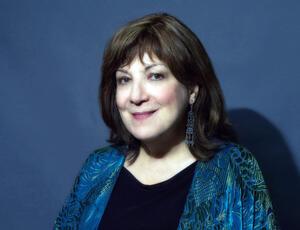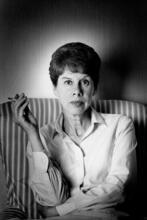Avivah Gottlieb Zornberg
Born in London to parents who had fled Vienna for England after the Nazi takeover of Austria, Avivah Gottlieb Zornberg is a highly regarded Torah scholar and author. After receiving a PhD in English literature and teaching at Hebrew University of Jerusalem, she left academia and entered the world of adult Jewish education, where her teaching resonated and her reputation grew. She also began to write, drawing extensively from the well-spring of her classes on the weekly Torah portion. She has written books on Genesis, Exodus, Numbers and Moses. Her complex interpretive lens is both contemporary, in drawing from literary sources, philosophy, and psychoanalytic theory, and very traditional, in reading the Bible through the lens of classic commentaries and rabbinic midrash.
Family and Education
Avivah Gottlieb Zornberg was born during the bombings of London in 1944 to parents who had fled Vienna for England after the Nazi takeover of Austria. During the Second World War, her father, Rabbi Wolf (Zeev) Gottlieb, taught Jewish children brought to England through the Kindertransport in a hostel at Gwrych Castle in North Wales. After the war, Rabbi Gottlieb and his wife discovered that most of their family had been killed in the Holocaust. Their first daughter was named “Avivah”—meaning spring—for the promise of renewal and solace that her birth intimated during and after such devastation.
To escape the bombing in London, the family moved to Cambridge where, as Zornberg likes to say, she spent her infant years “in a pram outside King’s College.” In 1950, they moved to Glasgow, Scotland, where her father served as Rabbi of Queens Park Hebrew Congregation and head of the Rabbinical Court until 1976.
Rabbi Gottlieb was his daughter’s first teacher. In 1921 at the age of eleven, Gottlieb moved to Vienna with his family from a shtetl in eastern Galicia. He dedicated himself to Torah studies and later completed a doctorate in Semitics at the University of Vienna. In 1937, he became the spiritual leader of the Zionist religious movement HaShomer Hadati, later called Bnei Akiva, and married Bracha (Betty), the daughter of Rabbi Avraham Aryeh Rosen and sister of the Chief Rabbi of Romania, David Moses Rosen. The couple shared a deep commitment to both Torah and modern, progressive values. They raised and educated their two daughters, Avivah and Freema, in the spirit of humanism and deep learning. The sisters attended the local grammar school, where Greek and Latin were taught alongside the normal high school curriculum. They were tutored one-on-one by their father in Tanakh and Medieval commentators. Zornberg attributes her loving intimacy with Torah to this devoted and imaginative learning with her father.
Encouraged by her teachers and parents, Zornberg won a scholarship to Girton College, Cambridge University. Before commencing her studies at Cambridge, she studied at Gateshead Seminary for a year (1961/2)—at the time the only institution providing a serious Torah education to women. At Cambridge, she completed a BA in 1965 and a PhD in English literature in 1970 and wrote her doctoral dissertation, a biographical literary study of the nineteenth- century novelist George Eliot (Mary Ann Evans 1819-1880).
Hebrew University and Family
Zornberg took a position as a professor of English literature at the Hebrew University of Jerusalem in 1969. She taught in the English Department for seven years, focusing on the nineteenth-century novel and the metaphysical poets. In 1976, she left the Hebrew University when her contract was not renewed; she had not yet found her writing voice and so did not publish, a requirement for receiving tenure at the University.
In 1975, she married Eric Zornberg (a PhD in physics from the University of Chicago). They have three children: Bracha (named after Zornberg’s mother), born in 1976, Moshe (Yarden), born a year later, and Avi, born in 1980. The family now has many grandchildren.
Adult Torah Education
While raising young children, Avivah Zornberg moved into the world of adult Jewish education. When still in her teens while at Cambridge, she had written a book of Bible studies, Sabbath Shiurim, based on the teachings of Rabbi M. Miller (published by Gateshead Foundation for Torah in 1969), which had won acclaim in Orthodox Jewish circles. After leaving the Hebrew University, Feldheim Publishers, an Orthodox press, commissioned her to translate a work about the Book of Proverbs by the great nineteenth-century biblical commentator known as the Malbim, which was published in 1982.
In 1980, Zornberg began teaching Parashat Shavua (the weekly Torah portion) to a women’s group in her neighborhood, preparing all week for the one class. She developed an approach in which serious scholarship and a large allusiveness worked “to tell all the truth but tell it slant” (Emily Dickinson)—allowing Rashi and Kafka, psychoanalytic concepts and midrash, to address each other. Her teaching resonated with listeners and her reputation grew. In Jerusalem, she taught at the Israel Center, Midreshet Lindenbaum (then called “Bravender’s”), Matan, Pardes, and Yakar—Orthodox institutions that offered high level learning for women. She started lecturing abroad, on tour with Rabbanit Malke Bina of Matan-the Sadie Rennert Women’s Institute for Torah Study, and later branching out on her own.
Writing and Scholarship
Zornberg also began to write, drawing extensively from the well-spring of her weekly classes on Parashut Shavua. Writing did not come easily to her, but she eventually discovered her unique style. That style entails a complex interpretive lens—both contemporary, in drawing from literary sources, philosophy, and psychoanalytic theory, and very traditional, in reading the Bible through the lens of classic commentaries and rabbinic midrash.
Zornberg’s first watershed book, Genesis: The Beginning of Desire, was published in 1995 and won the National Jewish Book Award for non-fiction. In this book, she for the first time gave written expression to the varied disciplines and sources that characterize her oral teaching. Since then she has published The Particulars of Rapture: Reflections on Exodus (2001), The Murmuring Deep: Reflections on the Biblical Unconscious (2009), Bewilderments: Reflections on the Book of Numbers (2015), and Moses: A Human Life, published as part of the Yale series on Jewish Lives in 2016.
In her work on Moses, Zornberg portrays the prophet as a man “born into a world of genocide” and unconsciously “nurtured in fear.” Drawing on scholarship in trauma and memory studies, she posits that his perceived speech defect—“heavy of mouth and heavy of tongue”—emerges from his hybrid identity. Born a Hebrew slave yet raised a prince in the Egyptian palace, Moses discovers his Israelite roots relatively late in life. This theme leads Zornberg to George Eliot’s novel, Daniel Deronda, where the hero is compared, explicitly, to Moses. The comparison sheds unexpected light on Moses' insider/outsider status, as well as on the poignant fact that Moses’ fate is to remain outside the promised land. In Kafka’s words, this is “not because his life is too short, but because it is a human life.” This excerpt from Kafka’s diary (1921) points to Zornberg’s central concern: what does it mean to be born into a context of trauma, of hidden identities, of silence, and to emerge into the role of speaking for Israel?
Recognition and Awards
In 1996, Zornberg appeared on the PBS TV series, “Bill Moyers: Genesis—A Living Conversation.” In 2005 she was awarded an Honorary Doctorate from the Jewish Theological Seminary and delivered the Haskell Lectures at Oberlin College. In 2009, she received The Maurice N. Eisendrath Bearer of Light Award from the Union for Reform Judaism, and in 2019, she was awarded an Honorary Doctorate by Hebrew College in Boston.
Zornberg continues to teach weekly in Jerusalem and travels abroad to lecture at universities, synagogues, Jewish community centers, and psychoanalytic institutes across North America. She also travels to the United Kingdom, where she holds a Visiting Lectureship at the London School of Jewish Studies.
Selected Works by Avivah Gottlieb Zornberg
“The Concealed Alternative,” in Reading Ruth: Contemporary Women Reclaim a Sacred Story, edited by Gail Twersky Reimer and Judith A. Kates, 65-81. New York: Ballantine Books, 1994.
Genesis: The Beginning of Desire: Reflections on Genesis. Philadelphia: Jewish Publication Society, 1995; renamed The Beginning of Desire: Reflections on Genesis. New York: Schoken, 2011.
“Cries and Whispers: The Death of Sarah,” in Beginning Anew: A Woman's Companion to the High Holy Days, edited by Gail Twersky Reimer and Judith A.Kates, 174-200. New York: Touchstone, Simon & Schuster, 1997.
The Particulars of Rapture: Reflections on Exodus. New York: Schocken, 2001.
“The Exile of the Word” in Diaspora: Homelands in Exile; Voices (Vol. 2), by Frédéric Brenner, New York: Harper Collins, 2003.
“Seduced into Eden: The Beginning of Desire,” in Longing: Psychoanalytic Musings on Desire, edited by Jean Petrucelli, 193-225. New York: Karnac Books, 2006.
“Jonah: A Fantasy of Flight,” in Psychoanalytic Dialogues 18:3 (2008): 271-299.
“‘Let me see that good land: The Story of a Human Life,” in Answering a Question with a Question: Contemporary Psychoanalysis and Jewish Thought, edited by Lewis Aron and Libby Henik, 236-264. Brighton, MA: Academic Studies Press, 2009.
The Murmuring Deep: Reflections on the Biblical Unconscious. New York: Schocken 2009.
“'From Another Shore’: Moses and Korah,” in Radical Responsibility: Celebrating the Thought of Chief Rabbi Lord Jonathan Sacks, edited by Michael J. Harris, Daniel Rynhold and Tamra Wright, 217-244. Jerusalem: Maggid Press, 2013.
Bewilderments: Reflections on the Book of Numbers. New York: Schocken, 2015.
Moses: A Human Life. New Haven, CT: Yale University Press 2016.
Interviews with Krista Tippett, On Being
https://onbeing.org/programs/avivah-zornberg-the-genesis-of-desire/
https://onbeing.org/programs/avivah-zornberg-the-transformation-of-pharaoh-moses-and-god/
For a link to Avivah Zornberg’s website, including videos of her teaching, interviews, and lecture schedule see: http://www.avivahzornberg.com/
Adelman, Rachel. “The Radiance of My Teacher’s Face.” Sh’ma Journal: A Jounal of Jewish Ideas (2014).
Boyarin, Daniel. “Reading Genesis.” Tikkun Magazine 11:22 (1996).
Boulouque, Clémence. “A Biography of Moses, the Man.” The New York Times, December 1, 2016.




